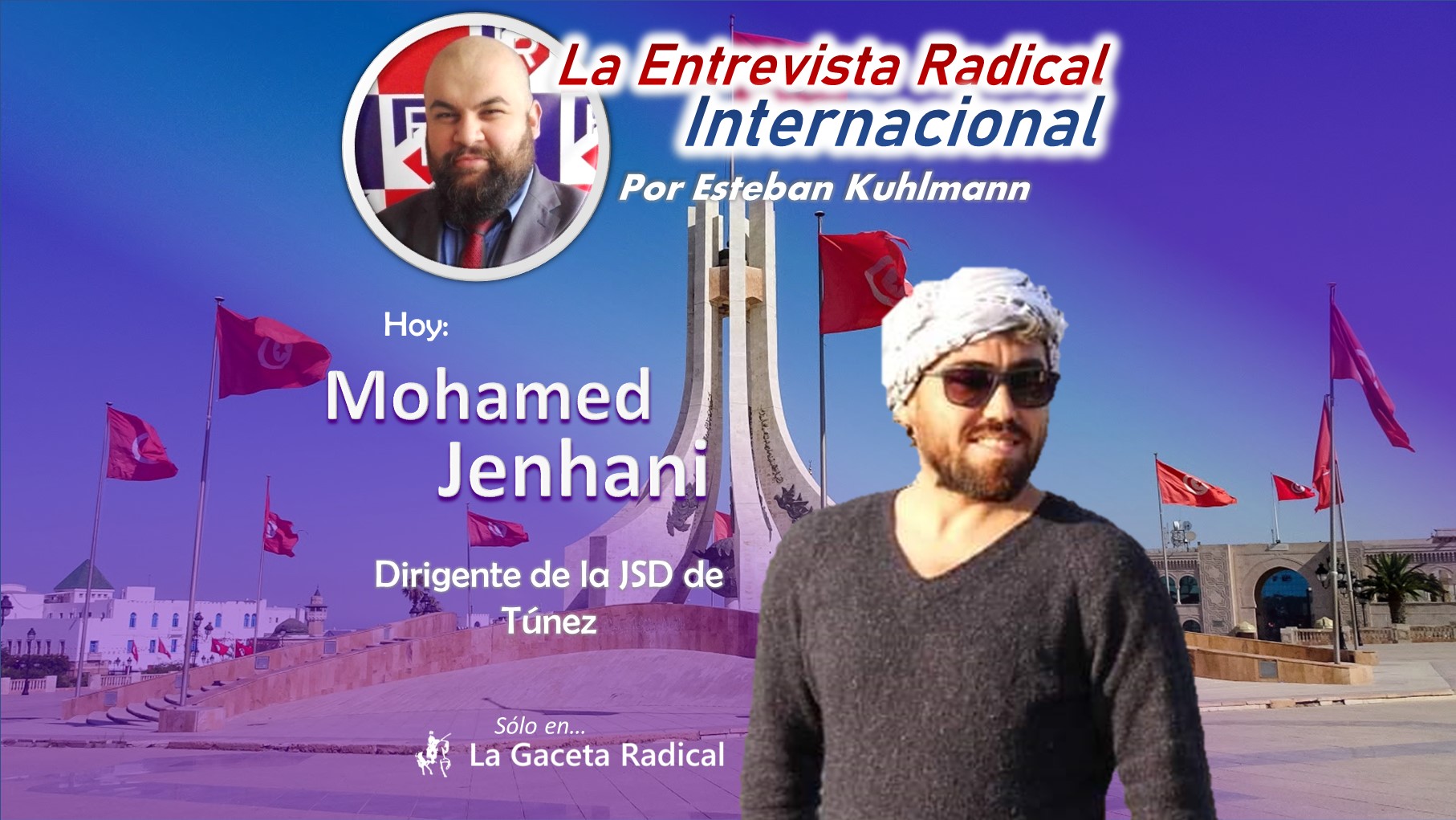Introducción
Mohamed es un joven nacido en la ciudad de Kélibia en el lejano país de Túnez. A pesar de su corta edad tiene gran experiencia en el ámbito político, habiendo sido coordinador regional de la JSD, asistente parlamentario de su partido y desde el 2017 es secretario general de la JSD. En el ámbito académico es ingeniero en redes y telecomunicaciones. Dicho eso, invitamos a todos y todas nuestras gacetistas a conocer un poco más de África y como se vive la política en estas tierras.
La Entrevista
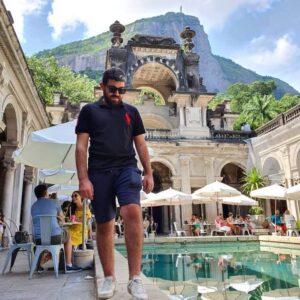 Muchas Gracias Mohamed por responder nuestras preguntas el equipo de La Gaceta Radical te da la más cordial bienvenida. Para comenzar nos gustaría saber un poco más de tu vida. ¿En qué momento de tu vida comienzas a interesarte por la política y en particular en la Jeunesse Social Democrate?
Muchas Gracias Mohamed por responder nuestras preguntas el equipo de La Gaceta Radical te da la más cordial bienvenida. Para comenzar nos gustaría saber un poco más de tu vida. ¿En qué momento de tu vida comienzas a interesarte por la política y en particular en la Jeunesse Social Democrate?
Antes de 2011 Túnez atravesaba una dictadura y un determinado régimen político, hasta que llegó la revolución, derrocó al régimen y el ex presidente huyó del país. La única inspiración para mí fue la juventud y la gente de Túnez. La juventud de Túnez que respiró libertad tras la represión. Por mi creencia en la justicia social, la igualdad entre ciudadanos y ciudadanas, la libertad de opinión y expresión, y los derechos económicos y sociales.
Elegí estar en un partido socialdemócrata, y fue el camino hacia el Partido ETTAKATOL Democrático por el Trabajo y las Libertades.
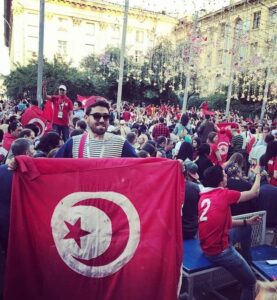 ¿Cómo es la vida en Túnez? Somos culturas muy lejanas con Chile, pero al parecer tenemos bastantes cosas similares… ¿Cuáles son los problemas de una persona común en tu país?
¿Cómo es la vida en Túnez? Somos culturas muy lejanas con Chile, pero al parecer tenemos bastantes cosas similares… ¿Cuáles son los problemas de una persona común en tu país?
Después de la revolución, Túnez se encuentra en una fase de transición democrática y el panorama político es muy dinámico y dramáticamente dramático. El sistema político aquí depende de la vida partidista. Es un sistema semipresidencial. Se apoya en dos jefes del poder ejecutivo: el presidente de la república, elegido por el pueblo y el jefe de gobierno elegido por el Parlamento.
Pero después de años de sequía política, hay una falta de madurez de los partidos políticos, y esto provoca frecuentes luchas políticas, lo que a su vez deteriora las condiciones económicas y sociales. En consecuencia, el desempleo es el mayor problema para los jóvenes tunecinos, con escaso poder adquisitivo.
Además de todos estos problemas, la clase política aún no ha declarado la guerra real a la corrupción administrativa y política que se ha acumulado desde la independencia y que incluso se ha ido asimilando para algunas personas como un fenómeno “normal”.
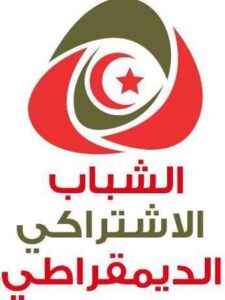 ¿Cómo es la relación que tiene tu partido con el actual gobierno en Túnez? Cuéntanos un poco de la realidad política de tu país y como la pandemia de Covid-19 los ha afectado.
¿Cómo es la relación que tiene tu partido con el actual gobierno en Túnez? Cuéntanos un poco de la realidad política de tu país y como la pandemia de Covid-19 los ha afectado.
Somos un partido que actualmente se opone a este gobierno. Primero, en la forma: porque este es un gobierno meramente administrativo, y consideramos que la solución pasa necesariamente por un gobierno político partidista o las elecciones se convertirán en un mero trámite sin incidencia real en el gobierno. Además, si el gobierno falla … ¿Quién se hará responsable? El jefe de gobierno es independiente de los partidos y los ministros, aquí estamos frente a personas que no pueden ser castigadas con las urnas.
En cuanto a la epidemia, ha agregado una crisis social al país y hay un fracaso en el manejo de la crisis el pueblo tunecino aún no se da cuenta de la fecha de la campaña de vacunación los políticos siguen en conflicto y la campaña electoral no se detiene.
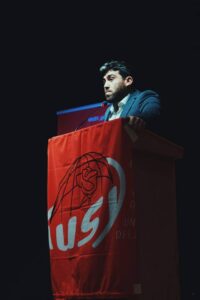 Sabemos que participas de algunas organizaciones internacionales como IUSY ¿Cómo piensas que la cooperación internacional es un motor de desarrollo humano?
Sabemos que participas de algunas organizaciones internacionales como IUSY ¿Cómo piensas que la cooperación internacional es un motor de desarrollo humano?
La cooperación internacional es nuestro objetivo. La epidemia actual es la mayor evidencia de esto, porque todos vivimos en la misma tierra y no hay fronteras entre nosotros cuando la humanidad se enferma y todos están en el mismo barco. Nuevamente, la cooperación internacional también es importante para defender a los oprimidos en el mundo.
Muchos pueblos viven todavía bajo la opresión, la injusticia y la humillación, y esperan que las personas libres del mundo sean su voz y conciencia. Desafortunadamente, todavía estamos en un mundo muy cruel, ya que los intereses económicos son los principales, ya que mata y desplaza a niños y personas en aras del poder o la riqueza. Con total ausencia de humanidad.
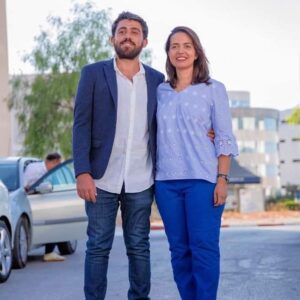 Para finalizar ¿Qué mensaje quieres transmitir a las amigas y amigos de Latinoamérica que te leen?
Para finalizar ¿Qué mensaje quieres transmitir a las amigas y amigos de Latinoamérica que te leen?
A los camaradas del mundo debemos unirnos en contra del surgimiento de partidos de derecha en el mundo, cooperar entre nosotros y aprender de las experiencias de los demás. Debemos ser la voz de los oprimidos en el mundo. En cuanto a los amigos en América del Sur y Central, debo decir que adoro esa tierra y adoro a esos pueblos que aman la vida, pero también noto que hay pobreza y disparidades sociales por eso siempre deben velar por un permanente rol social del estado. Especialmente en los campos de la salud, la educación y la lucha contra la corrupción.
Por último, quiero invitar a todos los compañeros con los que compartimos valores y principios, a participar en el encuentro Latin Arab en el Reino de Marruecos en mayo que será una reunión para conocerse y el inicio de una futura asociación.
ORIGINAL EN INGLÉS
Introduction
Mohamed is a young man born in the city of Kélibia in the distant country of Tunisia, despite his young age he has great experience in the political field, having been regional coordinator of the JSD, as well as a parliamentary assistant for his party and since 2017 is Secretary General of the JSD, in the academic field he is an engineer in networks and telecommunications, so today we are going to know a little more about Africa and how politics is lived in these lands.
Interview
Thank you, Mohamed, for answering our questions to our team. “La Gaceta Radical” gives you the warmest welcome. To start, we would like to know more about your life. When it began your interest in politics and particularly the Jeunesse Social Democrate?
Before 2011, Tunisia was going through a dictatorship and a political regime until the revolution came and overthrew the regime and the former president fled the country. The only inspiration for me was the youth and the people of Tunisia. The youth of Tunisia who breathed freedom after the repression. For my belief in social justice, equality between citizens, freedom of opinion and expression and economic and social rights.
I chose to be in a social democratic party, and it was the path to the ETTAKATOL Democratic Party for work and freedoms.
How’s your life in Tunisia? We have far cultures, but it seems we have a lot in common. Which are the problems of common people in your Country?
After the revolution, Tunisia is in a phase of democratic transition and the political landscape is very dynamic and dramatically dramatic. The political system here depends on partisan life. It is a parliamentary presidential system. It relies on two heads of the executive power: the president of the republic, elected by the people and the head of government elected by Parliament, but after years of political drought.
There is a lack of maturity of the political parties, and this is what causes frequent political struggles which caused the deterioration of the economic and social conditions, therefore, unemployment is the biggest problem for young Tunisians, with little purchasing power.
In addition to all these problems, the political class has not yet declared a real war on the administrative and political corruption that has accumulated since independence and has become a normal phenomenon at times for some.
How’s the relationship of your political party with the actual government of Tunisia? Tell us something about the political reality of your Country, and how the pandemic has affected you.
We are a party that currently opposes this government first, in the form: because this is a government with administrative powers, and we consider that the solution lies in a partisan political government or the elections will simply become a democratic procedure and also if the government fails … who will be responsible? The head of government is independent of the parties and the ministers are the same, here we are in front of people who cannot be punished with the ballot box.
As for the epidemic, it has added a social crisis to the country and there is a failure in handling the crisis, the Tunisian people still do not realize the date of the vaccination campaign, the politicians are still in conflict and the electoral campaign doesn’t stop.
We know you participate in some international organizations, like IUSY. Do you think international cooperation is like a motor of human development?
International cooperation is our destiny, the current epidemic is the greatest evidence of this. Because we all live on the same land and there are no borders between us when humanity gets sick and everyone is in the same boat, international cooperation is also important to defend the oppressed in the world.
Many peoples still live under oppression, injustice and humiliation, and they hope that the free people of the world will be their voice and conscience. Unfortunately, we are still in a bad world, since economic interests are the main ones, since it kills and displaces children and people for the sake of power or wealth. With total absence of humanity.
Last question: Which message would you like to send to your fellow latin americans readers?
As comrades of the world we must unite for the emergence of right-wing parties in the world, cooperate with each other and learn from the experiences of others and we must be the voice of the oppressed in the world as friends in South and Central America I adore that land and I adore those peoples who love life, but also note that there is poverty and social disparities, so you must always be with the social role of the state. Especially in the fields of health and education and fighting corruption.
Finally, I want to invite all the colleagues with whom we share values and principles, to participate in the Latin Arab meeting in the Kingdom of Morocco in May.
That it will be a meeting to get to know each other and the beginning of a future association.

